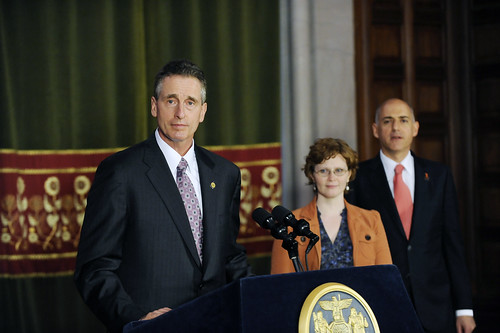FOR IMMEDIATE RELEASE: May 17, 2012
Contact: Alisa Costa, (518) 436-8757 x 122
alisa.costa@hungersolutionsny.org
HUNGER SOLUTIONS NEW YORK APPLAUDS GOVERNOR CUOMO FOR ENDING
FINGER PRINTING REQUIREMENT FOR FOOD STAMP APPLICANTS
Thousands more hungry New Yorkers will gain access to the food they need.
 |
| Lt.
Gov. Robert Duffy (left), Marie Farrel, FSP recipient (middle), Josh
Wachs of Share Our Strength (right) address anti-hunger advocates. |
Albany, NY—Thousands more hungry New Yorkers will have one less barrier to the food they need after Governor Cuomo’s announcement today that applicants will no longer need to submit finger prints when applying for food stamp benefits.
“Thanks to Governor Cuomo’s leadership a significant barrier to the Food Stamp Program was eliminated today,” said Linda Phelan Bopp, Executive Director of Hunger Solutions New York. “This policy change will ensure that the neediest New Yorkers will no longer be made to feel like criminals because they are hungry. We applaud Governor Cuomo for enabling thousands more people to put food on the table.”
At a time when nearly one in five New Yorkers and one in four families with children struggle to afford enough food, this important step can make a world of difference in helping the most vulnerable New Yorkers.
Hunger Solutions New York manages the state and federally funded Nutrition Outreach and Education Program (NOEP), one of the largest food stamp outreach programs in the nation. Through community-based work, approximately 25,000 new households each year apply for, and receive benefits.
Outreach workers find that finger printing requirements can be a deterrent to applying for food stamp benefits, especially for seniors and the disabled. Worse, many who have tried to comply with the process often must take extra time off from work, travel to separate locations, or are turned down due to clerical errors.
“When eligible applicants are prevented from gaining benefits, we all lose,” said Bopp. “Food stamp benefits are one hundred percent federal dollars. At New York State’s current enrollment of three million people, that’s over $5 billion in federal benefits coming into our state. Why would we want to prevent that money from helping people afford food for themselves and their families, especially if it brings money into our state’s economy?”
The Food Stamp Program (federally named SNAP, the Supplemental Nutrition Assistance Program), is our nation’s first line of defense against hunger. The Program stretches the monthly food budgets of all who meet program guidelines. Participants use an electronic benefits transfer (EBT) card to buy most foods and food-producing seeds and plants from local stores, bodegas and farmers markets, bringing billions of federal dollars into New York’s local economies each year.
The U.S. Department of Agriculture reports that every five dollars in food stamp benefits results in more than nine dollars in local economic benefit.
There are very few places in New York State, and in the nation, where this process is still required. New York City, where more than half of all the state’s food stamp recipients reside, has been the most persistent in its practice. Several upstate counties were still requiring finger printing in some circumstances.
“This policy change will level the playing field statewide and not treat applicants differently depending on their county of residence,” said Bopp. “In New York City alone we estimate nearly 700,000 people could be eligible to receive food stamp benefits who are not. Governor Cuomo is improving public policies to eliminate barriers and ultimately helping those who are hungry get the food they need.”
To find a local NOEP provider for help applying for food stamps, or to learn more about nutrition assistance programs, visit
www.FoodHelpNY.org.
Read Governor Cuomo's press release.

